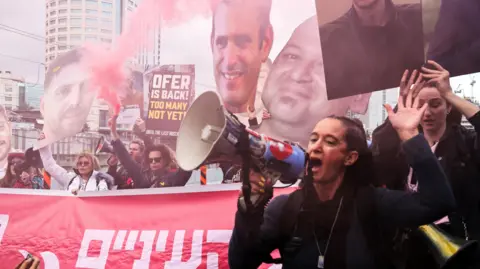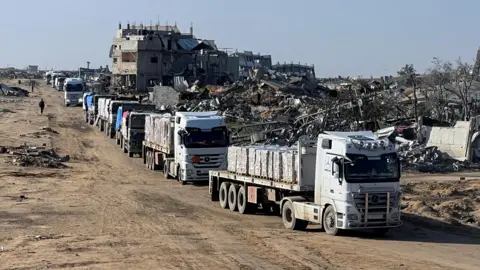 Reuters
ReutersHamas has said it is committed to implementing the Gaza ceasefire deal with Israel and will continue releasing hostages as scheduled, raising hopes that a resumption of the war can be averted.
Following talks in Cairo, the Palestinian armed group said mediators from Egypt and Qatar had confirmed they would “remove obstacles”. Egyptian and Qatari reports also said gaps had been bridged.
An Israeli government spokesman did not comment on the reports but stated that if Hamas did not free three living hostages on Saturday then the ceasefire would end.
Israel’s prime minister made a similar ultimatum on Tuesday after Hamas said it was postponing releases over what it claimed were Israeli violations.
Hamas said these included a failure to allow in the agreed amounts of vital humanitarian aid, including tents and shelters, which Israel denied.
The group’s threat to derail the deal prompted US President Donald Trump to propose Israel cancel the agreement altogether and “let hell break out” unless “all of the hostages” were returned by Saturday.
Israeli Prime Minister Benjamin Netanyahu said he welcomed Trump’s demand and warned: “If Hamas does not return our hostages by Saturday noon [10:00 GMT], the ceasefire will end and the [Israeli military] will resume intense fighting until the final defeat of Hamas.”
However, there were conflicting messages from Israeli officials about whether he was demanding the release of all 76 hostages still in Gaza – in line with Trump’s ultimatum – or just the three due to be freed this weekend.
On Wednesday, an Egyptian security source told the BBC that Egypt and Qatar were “intensifying their diplomatic efforts in an attempt to salvage the ceasefire agreement”, as Hamas’s leader for Gaza, Khalil al-Hayya, arrived in Cairo to hold talks with Egypt’s intelligence chief and other officials.
After concluding the talks on Thursday morning, Hamas put out a statement saying they focused on the need for all terms of the deal to be fulfilled, particularly regarding deliveries of caravans, tents, heavy construction equipment, medical supplies and fuel.
It added that the talks were “positive” and that the mediators had agreed to work to “remove obstacles and close gaps”.
“Accordingly, Hamas reaffirms its commitment to implementing the agreement as signed, including the exchange of prisoners according to the specified timeline.”
At the same time, Egyptian state-run Al Qahera TV reported that Egypt and Qatar had successfully “overcome obstacles” and that Israel and Hamas were committed to fully implementing the ceasefire deal.
Qatar-based Al Jazeera TV also said the negotiations had been successful and that mobile homes and heavy machinery would be allowed into Gaza on Thursday.
However, Israeli media then cited the Israeli prime minister’s office as calling the Al Jazeera report “fake news” and saying there was “no basis” to it.
Omer Dostri, a spokesman for the prime minister, later clarified the denial, writing on X: “There is no entry of caravans or heavy equipment into the Gaza Strip, and there is no co-ordination for this.”
When asked about Hamas’s statement at a later media briefing, another Israeli government spokesman said Israel’s position on the ceasefire agreement was “crystal clear”.
“There is a framework in place for the release of our hostages,” David Mencer said. “That framework makes clear that three live hostages must be released by Hamas terrorists on Saturday.”
“If those three are not released, if Hamas does not return our hostages, by Saturday noon, the ceasefire will end.”
 Reuters
ReutersWar-weary Palestinians in Gaza said they had been alarmed by the prospect of a return to fighting after 16 months of devastating war.
“When the truce was announced, we felt immense joy. However, with the announcement of a new crisis, fear returned [and] traders began raising commodity prices,” Mouti al-Qedra told BBC Arabic’s Gaza Lifeline programme.
“I pray to God constantly for lasting peace, especially after the martyrdom of 65 members of the al-Qedra family. Now, we are relieved that the crisis has been resolved, hoping no more martyrs will fall.”
The first phase of the ceasefire deal is supposed to last six weeks and see a total of 33 Israeli hostages exchanged for about 1,900 Palestinian prisoners and detainees from Gaza.
So far, 16 living Israeli hostages have been freed since the ceasefire took effect on 19 January. Hamas has also handed over five Thai hostages outside the terms of the deal.
The 17 other Israeli hostages due to be released during the first phase are two children, one woman, five men over the age of 50, and nine men under 50. They are supposed to be handed over in the next three weeks. Both sides have said eight of these hostages are dead, but only one has been named.
Negotiations for the ceasefire’s second phase – which should see the 43 remaining hostages released, a full Israeli withdrawal and a permanent ceasefire – have not yet begun.
The deal has also seen Israeli forces withdraw from densely populated areas of Gaza, hundreds of thousands of displaced Palestinians return to their homes in the north, and hundreds of aid lorries allowed into the territory each day.
The Israeli military launched a campaign to destroy Hamas in response to an unprecedented cross-border attack on 7 October 2023, in which about 1,200 people were killed and 251 were taken hostage.
More than 48,230 people have been killed in Gaza since then, according to the territory’s Hamas-run health ministry.
Most of Gaza’s population has also been displaced multiple times, almost 70% of buildings are estimated to be damaged or destroyed, the healthcare, water, sanitation and hygiene systems have collapsed, and there are shortages of food, fuel, medicine and shelter.



